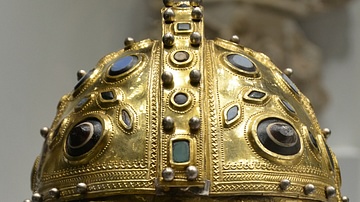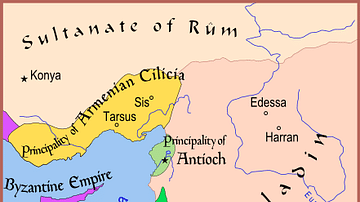Search Images
Browse Content (p. 1052)

Image
Great Viking Army in England, 865-878 CE
Map showing the routes allegedly taken by the Great Viking Army that invaded the Anglo-Saxon Kingdoms in 865 CE, under leadership of such chieftains as 'Hingwar', 'Hubba', and 'Halfdene' (Anglo-Saxon Chronicle for 870-871 CE). These figures...

Image
Saxo's Gesta Danorum
Original page from Saxo Grammaticus' Gesta Danorum - or Deeds of the Danish, written in Latin in the 13th century CE and here preserved in his own hand. It describes Danish history from prehistory through to the late 12th century CE and...

Image
Saladin and Guy of Lusignan
A 17th century CE painting by Jan Lievens of Saladin, Sultan of Egypt and Syria (r. 1174-1193 CE) and the French nobleman and king of the Kingdom of Jerusalem, Guy of Lusignan (r. 1186-1192 CE), enemies during the siege of Acre from 1189-1191...

Image
The Siege of Acre, 1189-91 CE
A medieval manuscript (c. 1280 CE) illustration depicting the 1189-91 CE siege of Acre during the Third Crusade. (Bibliotheque Municipale de Lyon, France)

Image
Late Roman Ridge Helmet
Roman parade helmet made of iron, silver and gold, and decorated with glass gems, Berkasovo, Serbia, 4th century CE. The photo was taken at the exhibition 'Treasures and Emperors. The Splendour of Roman Serbia' in Aquileia, Italy (11 March...

Image
Map of The Latin East, 1190 CE
A map of the Middle East showing the Crusader-held Latin East states at the time of the Third Crusade (1189-1192 CE).

Image
Latin Surrender to Saladin, 1187 CE
A painting depicting the surrender of the Latin ruler Guy de Lusignan to Saladin, the Sultan of Egypt and Syria (r. 1174-1193 CE), after the battle of Hattin in 1187 CE. The loss and subsequent capture of Jerusalem by Saladin would spark...

Image
Jerusalem Recaptured by Saladin
This print from 1683 CE depicts the recapture of Jerusalem in 1187 CE by Saladin (r. 1174-1193 CE) . Etching on paper. Measures 169 mm x 292 mm. (Rijksmuseum, Amsterdam)

Image
Fredrick I Barbarossa Flanked by His Sons
This image, a miniature from the "Welfenchronik" (History of the Guelphs), which dates to the late twelfth century CE, shows Frederick I Barbarossa (r. 1152-1190 CE), flanked by his sons.

Image
Richard I Marches to Jerusalem
A 19th century CE painting depicting Richard I (r. 1189-1199 CE) leading the march of the Crusader army to Jerusalem during the Third Crusade (1189-1192 CE).